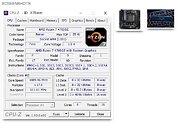Raevenlord
News Editor
- Joined
- Aug 12, 2016
- Messages
- 3,755 (1.16/day)
- Location
- Portugal
| System Name | The Ryzening |
|---|---|
| Processor | AMD Ryzen 9 5900X |
| Motherboard | MSI X570 MAG TOMAHAWK |
| Cooling | Lian Li Galahad 360mm AIO |
| Memory | 32 GB G.Skill Trident Z F4-3733 (4x 8 GB) |
| Video Card(s) | Gigabyte RTX 3070 Ti |
| Storage | Boot: Transcend MTE220S 2TB, Kintson A2000 1TB, Seagate Firewolf Pro 14 TB |
| Display(s) | Acer Nitro VG270UP (1440p 144 Hz IPS) |
| Case | Lian Li O11DX Dynamic White |
| Audio Device(s) | iFi Audio Zen DAC |
| Power Supply | Seasonic Focus+ 750 W |
| Mouse | Cooler Master Masterkeys Lite L |
| Keyboard | Cooler Master Masterkeys Lite L |
| Software | Windows 10 x64 |
A new HWBot entry has proven what some thought impossible years ago: AMD apparently features the best memory controller in the x86 consumer space. A user going by the alias Bianbao XE achieved a 6,666 MHz frequency on a single stick of Crucial Ballistix Max. The stick's original rating is for a mere 2,666 MHz - doesn't that put things in perspective?
Another thing that puts things into perspective is that the support for such an overclocking feat was a ROG Strix B550-I Gaming motherboard (min-ITX means smaller tracing distance between CPU and memory, and thus higher signal integrity) paired with none other than AMD's Ryzen 7 4700GE 'Renoir'. The APU was underclocked and overvolted - a technique that aimed to increase stability of the memory controller whilst also reducing operating temperatures (balancing the higher voltage and lower frequency). Of course, memory timings were loosened to achieve this feat (timings of 30-27-27-58 aren't what you'd usually like to see), but then again, this wasn't meant to power the utmost memory performance - only the highest frequency. And that was definitely achieved.


View at TechPowerUp Main Site
Another thing that puts things into perspective is that the support for such an overclocking feat was a ROG Strix B550-I Gaming motherboard (min-ITX means smaller tracing distance between CPU and memory, and thus higher signal integrity) paired with none other than AMD's Ryzen 7 4700GE 'Renoir'. The APU was underclocked and overvolted - a technique that aimed to increase stability of the memory controller whilst also reducing operating temperatures (balancing the higher voltage and lower frequency). Of course, memory timings were loosened to achieve this feat (timings of 30-27-27-58 aren't what you'd usually like to see), but then again, this wasn't meant to power the utmost memory performance - only the highest frequency. And that was definitely achieved.


View at TechPowerUp Main Site





